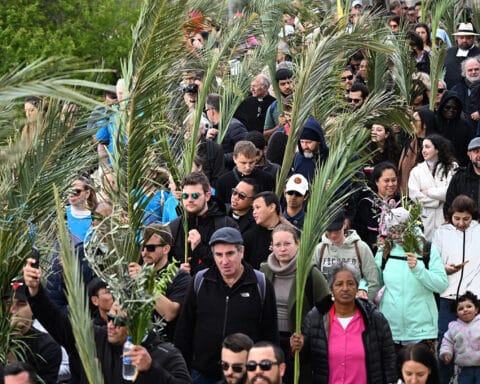
The readings for Palm Sunday take use from exaltation to mockery, from friendship to betrayal. At the beginning of Mass, with our palms in hand, we welcome Christ, our King, into Jerusalem, shouting, “Hosanna!” A half-hour later, we stand before Christ, who is now dressed in a scarlet red military cloak with a crown of thorns upon his head, and the words, “Let him be crucified,” wringing in our ears. What a momentous shift: from celebration to betrayal and rejection, from King to criminal in a matter of minutes.
But I want to draw our attention to the words of Christ that are spoken to Judas amid this great swing of emotion and loyalty. When Judas appears in the Garden of Gethsemane, having plotted and been paid for Christ’s betrayal, and accompanied by a large crowd, with swords and clubs, Christ simply says to him: “Friend, do what you have come for” (Mt 26:50).
| April 2 – Palm Sunday of the Lord’s Passion |
|---|
|
Mt 21:1-11 |
Friend!? Doesn’t this word strike straight to your heart in this moment? Doesn’t it “wake” us and ask us to watch and pray?
We know what Judas has done. He has purchased Christ’s life for 30 pieces of silver. He has arranged the sign of betrayal: a kiss of peace! And he then gives this kiss amid swords and clubs.
It is to this disciple and in this moment, to whom Christ says, “Friend.”
This word rises up like the eye of a hurricane, history storming down upon Christ, emotion and betrayal swirling about him. We, too, as we watch this history unfold. Having weathered Judas’ betrayal, our hearts are hit next with the flight of the disciples from the garden in fear, with the testimony of false witnesses, with Peter’s triple denial of Christ’s friendship, with the outrage of the high priests, the indifference of Pilate, and even with the derision of the revolutionaries crucified at Christ’s side.
Christ does not speak the word “friend” again as this all unfolds. In fact, he is rather quiet, silent even before Pilate — he did not answer him one word.
Yet, Christ’s silence and all of Christ’s actions lived out this word “friend.” As all of this tumult of betrayal and rejection unfolds, Christ is handing himself over. Only in this way, by hand himself over, can his death become a self-gift. This gift is displayed on high, for all to see upon the cross. As we watch and pray, we see Christ give himself completely, for the friends who betrayed and mocked and crucified him. We see him live his friendship out to the end.
And so as we approach Palm Sunday and enter into Holy Week, I suggest we meditate upon this word of Christ’s: “friend.” And, perhaps, I can also direct our attention to a character in this hurricanic story who responds to Christ’s active self-gift as a friend: Simon the Cyrenian.
Simon the Cyrenian comes quietly onto the scene in Matthew 27:32, compelled by the crowd to carry Christ’s cross. Dwell here for a moment. Dwell on Simon’s act while fully aware of the turbulent contempt and ridicule surrounding Christ as he struggles along the Way of the Cross. Simon steps in and helps Christ bear the load. He is, in fact, the only person in our history with the unique experience of carrying Christ’s cross.
This Palm Sunday and throughout Holy Week, dwell upon Simon and his act of compassion. Let him compel us toward Christ in friendship and a share in his cross.
Catherine Cavadini, Ph.D., is the assistant chair of the University of Notre Dame’s Department of Theology and director of its master’s program in theology.





